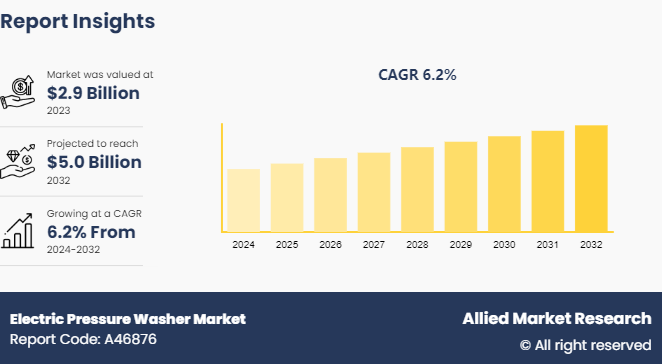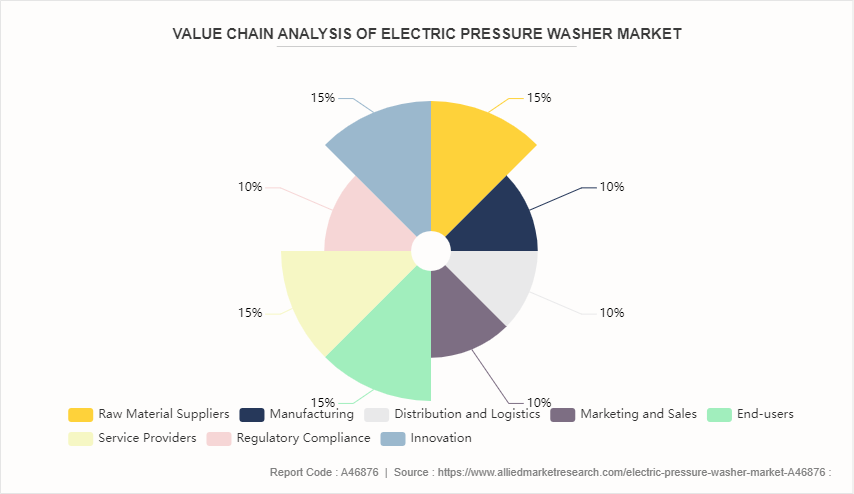Electric Pressure Washer Market Research, 2032
The global electric pressure washer market was valued at $2.9 billion in 2023, and is projected to reach $5.0 billion by 2032, growing at a CAGR of 6.2% from 2024 to 2032.
Market Introduction and Definition
Electric pressure washers, which run on electricity, provide a practical and eco-friendly method for cleaning a variety of surfaces. These machines utilize a motor to increase water pressure, resulting in a strong stream that helps eliminate dirt, grime, and stains. The advantages of electric pressure washers include effective cleaning and eco-consciousness through water conservation. Electric pressure washers are available in a range of types, such as compact, medium-duty, and heavy-duty models. These different types are designed to meet various cleaning requirements, ranging from simple household chores to demanding industrial applications. In addition, electric pressure washers are a convenient, cost-effective, and eco-friendly option for cleaning tasks. The electric pressure washer market analysis is projected to grow significantly over the next few years owing to increasing demand for efficient cleaning solutions. The electric pressure washer market forecast predicts substantial growth in the coming years, driven by technological advancements and rising consumer awareness.

Key Takeaways
The electric pressure washer market study covers 20 countries. The research includes a segment analysis of each country in terms of value ($Billion) for the projected period 2024-2032.
More than 1, 500 product literatures, industry releases, annual reports, and other such documents of major Electric pressure washer industry participants along with authentic industry journals, trade associations' releases, and government websites have been reviewed for generating high-value industry insights.
The study integrated high-quality data, professional opinions and analysis, and critical independent perspectives. The research approach is intended to provide a balanced view of global markets and to assist stakeholders in making educated decisions in order to achieve their most ambitious growth objectives.
Key Market Dynamics
The electric pressure washer market overview highlights the sector's rapid growth, fueled by increasing demand for efficient cleaning solutions in both residential and commercial spaces. Electric pressure washers are popular owing to its eco-friendliness as it does not rely on burning fossil fuels, resulting in reduced carbon emissions and air pollution. The growing awareness about the benefits of using electric over gas-powered washers is contributing to the rise in the electric pressure washer market size. This characteristic makes them a more environmentally friendly choice, particularly in areas with strict air quality and environmental regulations. In addition, electric pressure washers have become more energy-efficient due to advancements in motor and pump technologies. The latest electric motors are specifically engineered to maximize efficiency, converting a greater amount of electrical energy into mechanical power for cleaning purposes. These motors often come equipped with automatic shut-off systems and variable speed settings, allowing for optimized energy usage depending on the specific cleaning job. This enhanced efficiency not only decreases electricity usage, but also reduces operational expenses in the long run, making electric models an ecofriendly and cost-effective option for both individuals and businesses.
Electric pressure washers typically have more competitive pricing compared to gas-powered models owing to the simpler construction and lower manufacturing costs of electric motors. This affordability allows a wider range of users to access electric models, especially those who are hesitant about the higher initial costs of gas-powered options. E-commerce platforms are becoming an increasingly important distribution channel, affecting the electric pressure washer market share.
Electric pressure washers are designed with the user in mind, prioritizing user-friendly features. They are lightweight, making them easy to maneuver, and are suitable for both homeowners and professionals due to their ergonomic design. They operate quieter than gas-powered models, reducing noise pollution and creating a more comfortable work environment. On top of that, they come with convenient features such as onboard detergent tanks, quick-connect fittings, and easy-access storage for accessories, enhancing overall user experience. Urbanization and the expansion of commercial establishments are positively impacting the electric pressure washer market growth.
Value chain analysis for the electric pressure washer market

Raw Material Suppliers: Provide materials such as plastics, metals, and electrical components.
Manufacturing: Assemble components into finished products, ensuring quality through rigorous testing.
Distribution and Logistics: Transport products to wholesalers, retailers, and end-users efficiently.
Marketing and Sales: Promote products through various channels and manage sales to residential and commercial customers.
End-users: Use electric pressure washers for home maintenance or in commercial applications.
Service Providers: Offer maintenance, repair services, and customer support.
Regulatory Compliance: Ensure adherence to safety and environmental standards.
Innovation: Invest in R&D for product enhancements and integrate new technologies.
Market Segmentation
The Electric pressure washer market is segmented into type, application, pressure and region. On the basis of type, the market is divided into compact, medium duty, and heavy duty. On the basis of application, the market is bifurcated into commercial, residential, and industrial. As per pressure, the market is segregated into 0–1, 500 PSI, 1, 501–4, 000 PSI, and Above 4, 000 PSI. Region wise, the market is analyzed across North America, Europe, Asia-Pacific, LA, and MEA.
Regional/Country Market Outlook
Electric pressure washers are witnessing strong growth in demand throughout the Asia-Pacific region due to a mix of micro and macro factors that address various market requirements and trends. The rise in urbanization and infrastructure projects in countries such as China, India, and Southeast Asian nations is fueling the need for effective cleaning solutions. These washers play a important role in preserving the cleanliness of building exteriors, public areas, and industrial sites, making them increasingly popular in urban settings. In addition, the strict environmental regulations and increasing focus on sustainability have significantly contributed to the rising popularity of electric models. These devices produce zero emissions while in operation, making them a favorable choice for those seeking environmentally friendly alternatives to gas-powered washers.
Competitive Landscape
The major players operating in the Electric pressure washer market include Alfred Kärcher GmbH & Co. KG, Nilfisk, Andreas Stihl AG & Company KG, BriggsandStratton, Robert Bosch GmbH, TTI, Inc, Annovi Reverberi S.p.A., Electric Pressure Washer, Stanley Black & Decker, Inc. and Makita Corporation.
Industry Trends
In March 2023, FNA Group expands its North American manufacturing operations to incorporate internal combustion engines. FNA Group is a global manufacturer of a wide range of products including electric and gas pressure washers, cold and hot water pressure washers, pressure washer pumps, generators, water pumps, high pressure thermoplastic hoses, accessories, and replacement parts. Our products are sold worldwide through various channels such as retailers, distributors, dealers, and online platforms.
Key Sources Referred
International Trade Administration
European Cleaning Machines Association
Japan Cleaning Equipment Manufacturers Association (JCEMA)
U.S. Census Bureau
Key Benefits for Stakeholders
This report provides a quantitative analysis of the electric pressure washer market segments, current trends, estimations, and dynamics of the market analysis from 2023 to 2032 to identify the prevailing electric pressure washer market opportunities.
The market research is offered along with information related to key drivers, restraints, and opportunities.
Porter's five forces analysis highlights the potency of buyers and suppliers to enable stakeholders market profit-oriented business decisions and strengthen their supplier-buyer network.
In-depth analysis of the electric pressure washer market segmentation assists to determine the prevailing market opportunities.
Major countries in each region are mapped according to their revenue contribution to the global Electric pressure washer market statistics.
Market player positioning facilitates benchmarking and provides a clear understanding of the present position of the market players.
The report includes the analysis of the regional as well as global Electric pressure washer market trends, key players, market segments, application areas, and market growth strategies.
Electric Pressure Washer Market Report Highlights
| Aspects | Details |
| Market Size By 2032 | USD 5.0 Billion |
| Growth Rate | CAGR of 6.2% |
| Forecast period | 2024 - 2032 |
| Report Pages | 315 |
| By Type |
|
| By Application |
|
| By Pressure |
|
| By Region |
|
The residential industry is leading the market with higher demand for electric pressure washer
The global electric pressure washer market is valued at $2.9 billion in 2023 and is estimated to reach $5.0 billion by 2032, exhibiting a CAGR of 6.2% from 2024 to 2032.
Asia-Pacific is accounted for largest market share in electric pressure washer market
The top companies analyzed for electric pressure washer market report are Alfred Kärcher GmbH & Co. KG, Nilfisk, Andreas Stihl AG & Company KG, BriggsandStratton, Robert Bosch GmbH, TTI, Inc, Annovi Reverberi S.p.A., Electric Pressure Washer, Stanley Black & Decker, Inc. and Makita Corporation.
Electric pressure washers typically have more competitive pricing compared to gas-powered models owing to the simpler construction and lower manufacturing costs of electric motors. This affordability allows a wider range of users to access electric models, especially those who are hesitant about the higher initial costs of gas-powered options.
Loading Table Of Content...



